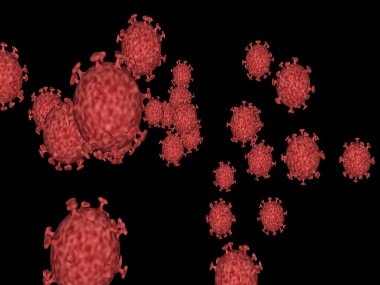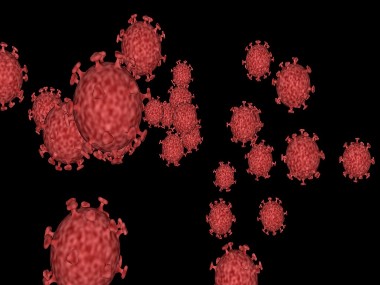Researchers at the Indian Institute of Technology Delhi’s Kusuma School of Biological Sciences have developed a detection test kit. The Indian Council of Medical Research (ICMR) has already approved the low-cost test kit developed by the team led by Dr Bishwajit Kundu, making IIT Delhi the first academic institute to have obtained an ICMR approval for real-time testing of COVID-19. [caption id=“attachment_8237661” align=“alignleft” width=“380”]  Representational image. Image by HenkieTenk from Pixabay.[/caption] Dr Kundu, along with Dr Parul Gupta, Prashant Pradhan and Dr Akhilesh Mishra, spoke to myUpchar’s Natasha Satija to explain the nature of their testing kit and the motivation behind creating it.
Can you tell us a bit about the COVID-19 testing kit you have developed at IIT Delhi?
Dr Bishwajit Kundu: The kit is a probe-free detection kit. So far, the kits available in the market require a fluorescent probe which has to be purchased from abroad most of the time, and that costs a lot. This, being a probe-free kit, is expected to cost much less.
How did you come up with the idea of the test?
Dr Parul Gupta: We were working on other projects related to this virus. It was during the time when Indian students in Wuhan were being airlifted (January-February 2020). We realised it right then that it was very important for India to have its own testing kit. Because once the situation worsens here, there would be a lockdown, and procuring things from outside will be extremely difficult. India needs to have an in-house kit of its own. This was our inspiration and motivation behind creating this testing kit.
How much does the kit cost if the probe is purchased from abroad?
Dr Kundu: I wouldn’t be able to tell you the exact cost of the probe, but the kit available in the market today costs Rs 4,500 per test. The kit developed by Mylabs is said to cost Rs 1,200, but I don’t know how much they are charging per test. We did not calculate the exact cost of the kit that we have developed, but it will roughly fall around Rs 750-800 per test.
How is a probe different from a dye? How do the two work?
Prashant Pradhan: Our method is probe-free, which means we are not using any kind of TaqMan probe which adds to the cost. We are using SYBR Green dye for this detection. This test needs a lot of optimisation because it is an SYBR Green-based assay. We have optimised it based on some molecular signatures that we found in COVID-19 that were conserved till date; we utilised those signatures to develop this.
What signatures are being used? Is it the sequence of the RNA?
Prashant Pradhan: Yes, it is an RNA sequence. We utilise those areas of RNA which are conserved till date and didn’t mutate. So, we are utilising those areas, and that’s why this test becomes very specific and sensitive too.
How do the tests involving the use of probes and dyes differ from each other?
Prashant Pradhan: In the case of a dye, like SYBR Green, the dye will give a signal. Whereas in a test involving a probe, the probe itself is meant to give a signal. In a probe-free method, the dye is able to give the signal, which is much cheaper than using a probe. A probe is a single-stranded DNA and it binds to that sequence where the extension is going on and results in fluorescence. In the test we have developed, SYBR Green directly binds to the amplified target region of the DNA and gives a fluorescent signal. The dye binds to all the copies of the DNA sequence that correspond to the target RNA sequence. And the signal will be stronger based on the binding. So, it can also tell about the viral load in a sample.
What are the three different stages in the test?
Prashant Pradhan: Our kit helps reduce one step from the entire process of the standard RT-PCR, and that’s why it’s called OneStep RT. Dr Parul Gupta: The regular three steps used are RNA isolation, conversion of RNA to cDNA and then using that cDNA to carry out the amplification process, which is called RT-PCR. First, the patient comes and the sample is collected either from the nasal swab or throat swab. That sample is used to isolate RNA by the lab person. That RNA is taken to conduct an RT-PCR in one step, where we convert the RNA to DNA, and use the DNA in the same tube to carry out our RT-PCR and evaluate how strong or weak the signal is, how much the viral load is, and where the person is indeed inspected or not. This way, we also help protect the health professional by reducing the number of times they are getting exposed to the contaminated samples.
Your testing kits are being tried at the National Institute of Virology in Pune. How far is it from being available?
Dr Kundu: The ICMR has approved six centres in India for different testing kits, whether they are being created by private companies or an institution for mass production and utilisation. ICMR is the nodal body that approves these kits. We are ready with all the ingredients, so it depends on which company decides to take it up and buy those ingredients. As a rough estimate, a company should be able to produce 50,000 tests within a week. That is the projection we can make. For more information, read our article on RT-PCR Test. Health articles in Firstpost are written by myUpchar.com, India’s first and biggest resource for verified medical information. At myUpchar, researchers and journalists work with doctors to bring you information on all things health.


)

)
)
)
)
)
)
)
)



